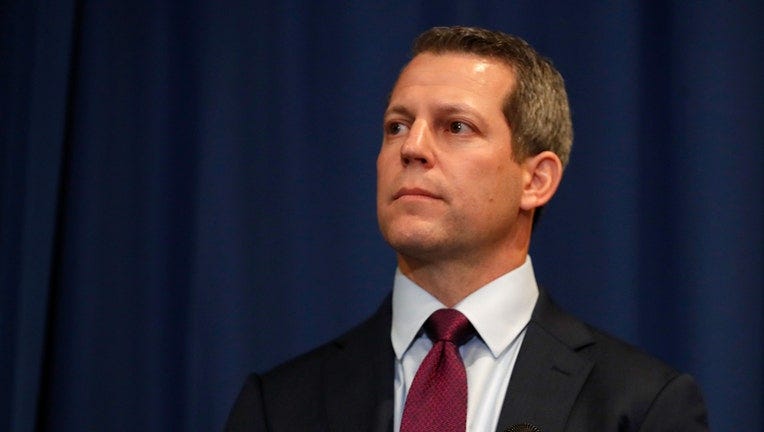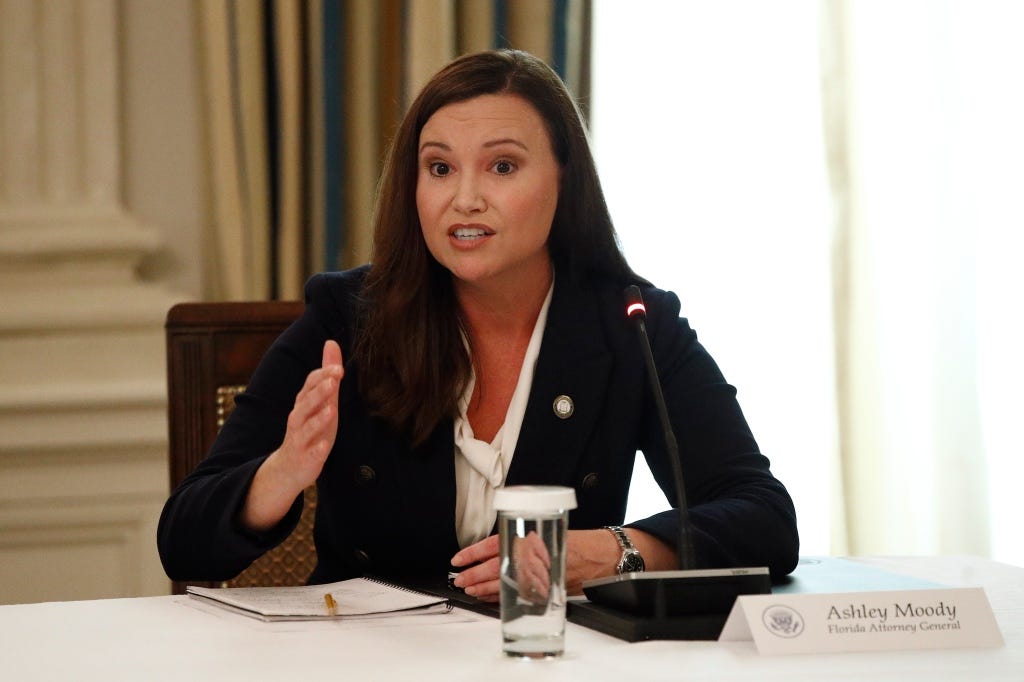DeSantis unveils immigration plan, vows to terminate birthright citizenship, DeSantis asks federal court to dismiss Disney lawsuit, and more...
June 30, 2023 — This Week's Top Stories in Florida
Welcome to this week’s edition of Floridian Today, a newsletter about all things Florida — from politics, business, real estate, and climate. Reporting from the Sunshine State, these are the most important stories you need to know. To never miss an update, subscribe here:
Here’s the latest from Florida…
DeSantis unveils immigration plan, his first major policy rollout
In an announcement from the Texas border town of Eagle Pass on Monday, Gov. Ron DeSantis made his first major policy platform rollout since he entered the Republican presidential primary contest last month. Unveiling a hardline immigration plan of more than 30 objectives he would institute as chief executive, the Republican governor criticized former presidents that failed to curb the influx of illegal migrants across the southern border. He promised to take definitive action to “get the job done” by releasing a sweeping “No Excuses” border plan focused on limiting border crossings, increasing deportations, targeting drug cartels, and completing construction of the border wall. Following in the footsteps of former President Donald Trump, who made immigration a signature issue during his first campaign in 2016, DeSantis seeks to bolster his conservative credentials and appeal to the base that supported Trump's tough stance on immigration. The comprehensive “No Excuses” plan aims to enhance border security and crack down on illegal immigration, which includes ending the so-called “catch and release” policy by detaining undocumented migrants while they await immigration court hearings; denying entry to migrants seeking political asylum; and taxing remittances, or money sent home by undocumented immigrants living in the U.S. to pay for border wall construction. DeSantis’ proposals would reinstate many of the Trump administration-era border policies such as the “Remain in Mexico” policy for asylum seekers and end the "Flores loophole," which requires migrant families to be released from custody within 20 days. One of the more controversial measures outlined by the Florida governor is his vow to use military force against Mexican drug cartels and drug smugglers, which would include deadly force if they try to cross the U.S.-Mexico border. This is in addition to hitting them with sanctions and penalties by designating them a “Transnational Criminal Organization.” The “No Excuses” proposals would also declare a national state of emergency and make completing the border wall a priority, which during the rollout, DeSantis seized the opportunity to criticize his rival Trump over his failure to complete it. Promising to deport individuals who have overstayed their visas, raising the salaries of Border Patrol agents, and imposing penalties on organizations or municipalities that violate federal immigration regulations or provide assistance to illegal border crossings are also covered. The plan consists of a wish list of oft-repeated GOP immigration recommendations, but DeSantis’ plan faces a likely uphill battle as it would need to overcome established legal precedents, federal court orders, obtain approval from other countries, or even require amending the U.S. Constitution.
DeSantis vows to terminate birthright citizenship if elected president
On the presidential campaign trail, Gov. DeSantis has unveiled a controversial immigration proposal that promises to abolish birthright citizenship to children of undocumented immigrants born in the United States. The “No Excuses” plan has sparked a heated debate as DeSantis aims to challenge the long-standing interpretation of the 14th Amendment, which grants citizenship to anyone born on U.S. soil or naturalized, regardless of their parent's immigration status. The controversial proposal has drawn both support and criticism from respective political factions and is an idea that has been floated in the past by candidates and anti-immigration groups. In 2018, former President Donald Trump pledged an executive order to eliminate the citizenship guarantee but never acted upon it. He has since reignited his promise to end the policy while campaigning for a second term. Referring to citizenship as a “prize” that spurs illegal migration, DeSantis and other proponents argue that ending birthright citizenship will discourage undocumented immigrants from taking advantage of the system and prioritize national security. He said that so-called “birth tourism” and the alleged abuse of citizenship laws are “inconsistent with the original understanding of the 14th Amendment,” and vowed to have the “failed policy” addressed by “the courts and Congress.” However, critics and immigration experts argue that ending birthright citizenship is unconstitutional by conflicting with the guarantees of the 14th Amendment, which reads: “All persons born or naturalized in the United States, and subject to the jurisdiction thereof, are citizens of the United States.” The policy has since been upheld by the U.S. Supreme Court and is established in multiple federal laws.
DeSantis asks federal court to toss out Disney lawsuit
Gov. DeSantis has requested a federal judge to dismiss the lawsuit filed against him in April by the Walt Disney Company, in which the company alleged the defendants violated their free speech rights in revoking Disney’s special tax status and self-governing authority. DeSantis, former Florida Department of Economic Opportunity (DEO) Acting Secretary Meredith Ivey, and members of the governor-appointed Central Florida Tourism Oversight District (CFTOD) are listed as defendants in the filing and have asked the Court to toss out the lawsuit, arguing they have immunity from the lawsuit. "The Court lacks jurisdiction over at least two defendants – the Governor and the Secretary – who are also immune from suit," attorneys for DeSantis wrote in the motion. “Neither the Governor nor the Secretary enforce any of the laws at issue, so Disney lacks standing to sue them." CFTOD board members also filed a separate motion with the Court, asking the judge to deny Disney’s earlier motion against them because they argue that the case is “not moot and a stay is not proper.” Counsel for the Governor and DEO Secretary posit that they are immune from Disney's claims and cannot be held accountable for the alleged harms mentioned in the lawsuit because “Disney lacks standing to sue them." In the initial lawsuit brought forth by Disney, both DeSantis and Ivey were named, with the company claiming that the officials collaborated to dissolve the Reedy Creek Improvement District, a special tax district for the theme park. This is the latest action in the ongoing year-and-a-half saga between Disney and DeSantis, which began last February when they publicly criticized the state’s Parental Rights in Education Law, which opponents referred to as the "Don't Say Gay" bill. The Florida Legislature and the Governor responded by stripping the Reedy Creek special tax district that gave the entertainment company self-governing authority. It was subsequently replaced by the Central Florida Tourism District Board, which is comprised of individuals appointed by DeSantis. Disney rebutted by filing a lawsuit that accused the state of Florida of engaging in a targeted “campaign of government retaliation.”
Florida Supreme Court upholds suspension of former State Attorney Andrew Warren
The Florida Supreme Court has dismissed a lawsuit brought by the suspended Hillsborough State Attorney Andrew Warren, citing an “unreasonable delay” in seeking relief, dealing a significant blow to his ongoing legal battle. Warren, a twice-elected Hillsborough County State Attorney, and a Democrat, was ousted from his position by Gov. DeSantis in August last year after being accused of “incompetence” and “neglect of duty.” The suspension was a result of signed pledges made by Warren not to prosecute those who seek or perform abortions or doctors who provide gender-affirming treatments to transgender people. Following his ouster, Warren filed a lawsuit against the Republican governor and has appealed to the state's highest court for reinstatement, in addition to the 11th U.S. Circuit Court of Appeals. In January, a U.S. District judge ruled that the suspension violated the U.S. Constitution and the Florida Constitution, but said he lacked authority to reverse DeSantis’ action. Warren appealed that decision with the 11th U.S. Circuit Court of Appeals in Atlanta and is awaiting a ruling. A 6-1 decision by the Florida Supreme Court came after it found that the suspended attorney had waited nearly five months after being removed from office to seek relief in state court. The ruling stated that he had not acted diligently in pursuing his case, and his delay ensured “that the 2023 regular session of the Florida Senate would come and go without any opportunity for that legislative body to potentially review the suspension.” The Florida Senate has the power to review the merits of executive suspensions, with the authority to reinstate or remove a suspended official from office. In his opinion, Justice Charles Canady reemphasized the role of the Senate in reviewing suspensions by the governor, writing, “the courts are not a “check upon any erroneous suspension action on the governor’s part”…our constitution has instead made the Senate the sole check upon any erroneous action on the governor’s part.”
Florida to allow radioactive waste in road construction

A bill that will allow potentially-cancer-causing radioactive mining waste to be used in road construction across the state has been signed into law by Gov. DeSantis. The legislation permits phosphogypsum, a radioactive byproduct of phosphate mining that contains harmful elements of uranium, thorium, and radium, to be added to a list of “recyclable materials” that state officials approved to be used in building roadways. Phosphate mining is a big business in Florida as it is used to create fertilizer, but the remaining phosphogypsum produces radon, which is a radioactive gas linked to cancer. In fact, radon is the second-leading cause of lung cancer and the greatest environmental source of radiation. As a result, the Environmental Protection Agency (EPA) has tightly regulated phosphogypsum’s use in projects and federally mandates the waste be stored in gypstack systems to limit its exposure to people and the environment. The bill signed by DeSantis directs a feasibility study by the Florida Department of Transportation (FDOT) be conducted to assess the suitability of phosphogypsum for road construction. This must be completed by April 1, 2024. Critics argue that such a study may not adequately address the health and safety concerns associated with this material and could leave a toxic legacy for future generations of Floridians to deal with. However, any requests to use phosphogypsum in roadways will be required to gain EPA approval first.
Florida AG fights recreational marijuana legalization
Florida Attorney General Ashley Moody has urged the state Supreme Court to reject a proposed constitutional amendment from going to voters in 2024 that would legalize marijuana across the state. The ballot measure in question would grant individuals aged 21 and above the legal right to “possess, purchase, and use marijuana products and accessories” for recreational purposes, if approved. Trulieve, the largest medical cannabis dispensary in the state, is backing the initiative. In a petition filed last week, Moody argued that the language on the ballot was “misleading” and failed to provide an honest portrayal of the potential changes. She claimed that the ballot question did not clearly state that marijuana would still be illegal at the federal level, despite the measure's assertion that federal law would not be changed or immunized. Recreational legalization of the substance gathered the necessary amount of signatures to place the issue on the ballot in 2024, but the Florida Supreme Court must first weigh in to determine whether the question as presented only addresses one subject and is easy to be understood by voters. Additionally, the Attorney General raised concerns about the Department of Health's ability to timely regulate the drug if the ballot measure were to pass. The request by Moody, a close Republican ally of DeSantis, comes less than a week after the Governor said he did not support decriminalizing cannabis at the federal level while on the presidential campaign trail. But he has supported access to medical marijuana, including signing a bill into law last week that would grant access to medically-prescribed cannabis through telehealth. Despite Moody's opposition and DeSantis' recent statement against cannabis legalization, polling indicates that a majority of American voters (59%) support legalizing recreational marijuana.
Florida’s largest police union endorses DeSantis for president
After backing former President Donald Trump in 2020, Florida's largest police union has thrown its weight behind Gov. Ron DeSantis, endorsing him in his 2024 White House bid. In a press release announcing the presidential endorsement, the Florida Police Benevolent Association (PBA) said the “choice could not be clearer” and called DeSantis “the most effective governor in the nation.” "In major cities and communities across America, many Americans are grappling with increased crime rates that not only jeopardize public safety but also threaten the quality of life in their communities," Florida PBA President John Kazanjian said. "The ideological experiment of defunding the police and scapegoating law enforcement for America’s social problems has failed." The state-wide police union has a total membership of over 36,000 certified law enforcement and corrections officers with numerous regional chapters. The Union said the Florida governor will "make public safety a top priority in the White House” and is "one candidate for president who has a proven track record in enhancing public safety and investing in the essential men and women who help maintain public safety every day.” One of DeSantis’ most significant initiatives has been ensuring Florida is a “law-and-order state” and has invested over $100 million to increase salaries of law enforcement officers and ensure they have the tools to do their jobs. This includes strengthening bail laws, granting tens of millions in recruitment bonuses for law enforcement officers, restoring retirement benefits to first responders, allocating $20 million to local law enforcement agencies to tackle the fentanyl crisis, and setting aside funds to provide recognition payments to public safety personnel. The governor’s office has touted Florida’s 50-year record low crime rate and the 10% year-over-year decline in crime.
DeSantis strips added protections for renters
Gov. DeSantis has signed a bill into law that will result in state law superseding local regulations pertaining to landlords and tenants, which critics argue allows fewer protections for renters and will result in them paying more for housing. The bill, known as HB 1417, preempts local regulations related to landlord-tenant relationships, agreements, and responsibilities, effectively consolidating authority at the state level. Over the past few years, cities and counties, including densely populated areas like Miami-Dade, Broward, Orange, Hillsborough, and Pinellas counties, have enacted ordinances commonly referred to as tenant "bill of rights." These ordinances expand upon the provisions of the Florida Residential Landlord and Tenant Act, covering various aspects such as rent increase notices, fee notices, and ownership change notifications. However, with the signing of this bill, these ordinances already in force will be nullified. One of the major implications of the law is the potential impact on local tenant bill of rights ordinances, including anti-discrimination protections, fair notice requirements, escalating rents, and evictions. Additionally, the bill allows landlords to charge renters a non-refundable monthly fee instead of a security deposit, but opponents say these fees could be uncapped, leaving renters vulnerable to exploitation. One positive aspect of the new legislation for tenants, it does extend the notice period for terminating month-to-month tenancy from 15 days to 30 days.
Florida’s housing market flattens, some blame DeSantis
The housing market in Florida, which experienced a surge during the pandemic, is now showing signs of slowing down, with home values plateauing for the first time since 2011. As the pandemic raged on, the Sunshine State became one of the hottest destinations for home seekers from across the country. However, the appeal seems to be diminishing due to affordability concerns and what some real estate agents consider the “DeSantis factor.” Together, the noticeable increase in housing costs amid rising prices and DeSantis’ campaign against so-called “wokeness” and his culture wars crusade are theorized as making Florida less attractive for potential buyers. However, the decline in interest is likely more about factors such as higher mortgage rates, insurance premiums, and already inflated housing prices. But some believe while the absence of state income tax and the desire to escape strict pandemic regulations initially drew people to the state, the political climate fostered by DeSantis’ public battles has altered perceptions from the allure. Some real estate agents have cited families who moved here during the pandemic expressing a change in sentiment and have left. Despite this, Florida still experienced a net increase in migration in 2023 and was at just a slightly lower rate compared to the peak of the pandemic in 2021. The single-family home value market has also since slowed down while insurance premiums in the state have risen significantly due to natural disasters, rampant fraud, and litigation, with the average premium skyrocketing 100% over the past three years, according to the Insurance Information Institute.
Zephyrhills issues one-year moratorium on new development
Zephyrhills, the fastest-growing city in Pasco County, has declared a growth moratorium on any new development due to insufficient water resources to sustain its expanding population. City officials have acknowledged that the recent surge in development has outpaced the local water supply infrastructure as the demand for water has exceeded the available resources. This one-year halt on development aims to address the growing concern over water scarcity, as the City nears its maximum limit on what it is allowed to withdraw from the underground aquifer. The moratorium will temporarily halt the issuance of permits for new construction projects until sustainable water management strategies can be implemented. Ironically, Zephyrhills is famous for the eponymous bottled water company sold regionally in the U.S. and sourced from local springs. City leaders are now focused on increasing its water-use permit that restricts how much water the Zephyrhills can withdraw from aquifers or surface water for existing customers and to future development.
Related: The country's largest man-made lagoon opens in Pasco County
Spanning 15 acres and made up of 33 million gallons of water and more than 17 million pounds of sand, Mirada Lagoon, the largest man-made lagoon in the U.S., is now open in Pasco County. The development, aimed at attracting residents to the adjacent 1,200-home community and boosting area tourism, has drawn criticism due to its potential strain on already limited water resources in neighboring Zephyrhills, which enacted a development moratorium to curb growth that may further deplete water reserves. Critics argue that such an extravagant project could exacerbate the problem, but Southwest Florida Water Management District Executive Director Brian Armstrong says that’s not the case. Speaking to WUSF, Armstrong said the Mirada Lagoon, due to its location, has different impacts on the basin that is central to the water supply concerns in Zephyrhills and the lagoon gets its water supplied from Pasco County, who can tap into resources from Tampa Bay Water. In fact, he said “once you fill [lagoons], it's almost zero net balance with the rainfall and the evaporation. So they are less intensive than, say a golf course.” The Mirada Lagoon is the latest of three such communities built in the Tampa Bay area by the Metro Development Group and will eventually have an estimated 4,500 homes once fully built out. Prices will range from the high $200,000s to nearly $1 million. Metro Development Group is currently planning four additional lagoon communities along Florida’s Gulf Coast.
Tampa welcomes new $150M motorsports attraction
Tampa residents and car enthusiasts have a reason to rev their engines as The Motor Enclave, the city's hottest new business, opens its doors. Offering an adrenaline-fueled experience, this state-of-the-art attraction features a 1.6-mile driving circuit, a 100-acre off-road experience, and a 37,000 square feet corporate event space that will be able to accommodate up to 1,200 people trackside. The highlight of the facility is its more than 300 trackside fully-customizable private garages, which are available for purchase and have been selling for up to $2.4 million. Founder and CEO Brad Oleshansky, a lifelong car enthusiast who previously established a similar venture in Michigan, chose Tampa as the perfect location for this new venture near the intersection of I-4 and I-75. Investors in the $150 million motorsports attraction hope the site will be a destination for unique events where hosts can treat their guests to thrilling rides in fast cars on the track, adding an extra level of excitement to any gathering. As The Motor Enclave has gained regional attention, sales for the private garages came quickly with Oleshansky revealing that out of the 300 available garages, only a few remained unclaimed as of last week. The fast success of The Motor Enclave signifies Tampa's growing appetite for high-octane entertainment and solidifies its position as a premier destination for motorsports enthusiasts.
Thanks for reading this edition of Floridian Today. To never miss an update, subscribe for free:
In the meantime, if you learned something or found this read interesting, please consider sharing it to grow our community!










